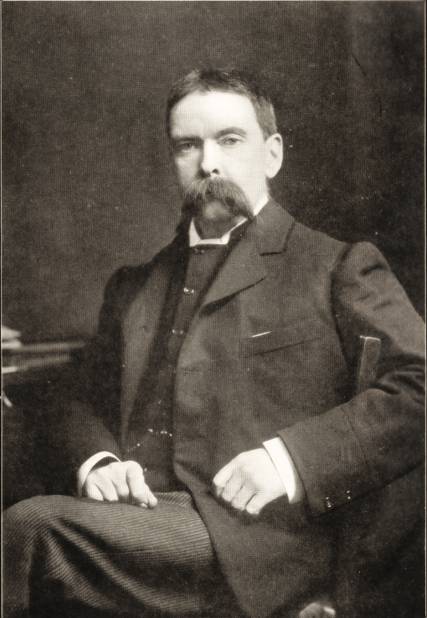In Memoriam: Langton Samuel Calvert
“Death cannot kill what never dies …. This is the Comfort of Friends, that though they may be said to Die, yet their Friendship and Society are, in the best sense, ever present, because Immortal.” – William Penn.
The sudden death of the Rev. L. S. Calvert on July 20th, 1909, at Eastrington Vicarage, Yorkshire, came as a shock to all members of the Club. It was known that his health had been indifferent for some time previously, but it was hoped that he had recovered from his illness, and this hope was encouraged when, at the Annual Dinner in Feb. 1909, his last public appearance amongst us, he appeared to have shaken off the lassitude of ill-health. All who were present on that occasion will remember his genial and witty speech and the pleasure he evidently felt in his association with the Club. That he ever realised the measure of affectionate regard which he inspired is doubtful, for his kindly nature was more attuned to giving than receiving.
The sense of personal loss to all who were brought into relation with him is deep and lasting, and his passing from our midst will leave a blank that will endure; but in the hearts of all who knew him there will ever remain the gracious memory of a singularly attractive personality, a true man and a Christian gentleman.
Langton Samuel Calvert was born in 1850. He took his degree at Trinity College, Dublin, and entering the scholastic profession, was appointed second master at Donnington Grammar School in Lincolnshire, under the Head-mastership of Dr. Constable. He took orders in 1876, and after a short period at Donnington, was appointed Senior Mathematical Lecturer at St. Mark’s College, Chelsea. In 1878 he was appointed Head Master of Batley Grammar School, an appointment which he held, with honour and success, for a period of thirty years. Immediately upon his settlement in Batley he married Miss Constable, daughter of Dr. Constable of Donnington. His was a busy life at Batley and extended over a wide range of interests. For 23 years he was Chaplain of the King’s Own Yorkshire Light Infantry and Brigade Chaplain of the West Humber Brigade for the last four years of his life. For his services he received the V.D. in 1907.
Keenly interested in music, he was for 25 years an active member of the Handel Festival Chorus, and during that period sang at every Festival, except one, when he was absent through illness. He was also present at the Festival in June, 1909, a month prior to his death. Of his musical abilities we have pleasant recollections and at the Annual Dinner a song from Calvert was an institution. Another of his many interests was Freemasonry, and he duly filled the office of Worshipful Master of his Lodge, No. 208, Dewsbury, and was appointed Provincial Grand Chaplain of West Yorkshire in 1896.
Embued with a love of nature and the mountains, his interest in all concerning mountaineering was constant and abiding, and his death will be heard of with real sorrow in the Alpine village of Saas Grund, where for many successive years he spent his holidays. Here, too, his magnetic personality made itself felt and throughout the district he was dubbed in affectionate jest “The King of Saas.” From time to time, by papers read before the Club, he has made us sharers in the pleasure he found there, and his ever present sense of comradeship and genial humour rendered any contribution from him an enjoyment to all. He visited Saas Grund each season from 1883 to 1897 and climbed so many of the neighbouring peaks that he became a recognised authority, and was asked by Mr. Whymper to look over the proof sheets of his guide book to that district. In 1899 and 1900 he visited Cortina, where he went up Col Rosá by the face and traversed the Kleine Zinne. In 1901 with some friends he traversed the Northern portion of the Albula District, making observations for the 2nd Edition of Ball’s Alpine Guide. The seasons of 1902-3-4-5 were spent at Saas Grund. He was elected to the Alpine Club in 1895.
It is, however, as a Rambler, that we, who were bound to him by so many ties of kindly deed and thought, shall remember him best. The opportunities which his constant attendance at our gatherings gave us of intimate association with him, served but to reveal the pure gold of his character and his genius for friendship. His catholicity of mind, genial presence and unselfish capacity to enter into the interests of others, invited confidences and many found in him a staunch friend and counsellor in difficulty.
His ready help in the affairs of the Club as Committee-man, Vice-President and President, are in the recollection of all. His diffidence in the acceptance of the Presidency was characteristic, but it is gratifying to remember that in yielding to the pressure put upon him, he realised a little of the esteem and affection in which we held him, and it is good to remember that in the dark days of his illness and depression the sense of our comradeship was a matter very near his heart.
Now the Great Silence has fallen, but there remains a fragrance, the memory of sunny days, the remembrance of a great heart whose life was an influence and challenge, calling out the best in his fellows. Such legacies as these are a rich inheritance, and of such as leave them it is true that they leave the World better than they found it.
A.C.
